| Srl | Item |
| 1 |
ID:
124647
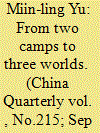

|
|
|
|
|
| Publication |
2013.
|
| Summary/Abstract |
The worldview as reflected in the textbooks of the People's Republic of China during 1949-1966 centred on Party-led nationalism, anti-imperialism and anti-colonialism. This article emphasizes both the continuities and changes in nationalist ideology during the Republican and Maoist periods. First, textbooks in Maoist China presented the imperialist powers as shifting away from Britain, Russia and Japan under the KMT government and towards the United States (since 1949) and the Soviet Union (since the 1960s), and emphasized class struggle. Second, the CCP had far greater control over the production of textbooks than the KMT. In this sense, the CCP truly carried out "partified" (danghua) education, a goal shared by the KMT which it never had the ability to achieve. In addition, "the language of Cultural Revolution" appeared with the outbreak of the Korean War. In other words, the education that cultivated revolutionary successors began in the early 1950s.
|
|
|
|
|
|
|
|
|
|
|
|
|
|
|
|
| 2 |
ID:
192450
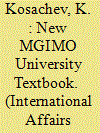

|
|
|
|
|
| Summary/Abstract |
RUSSIA'S higher education sector faces significant and difficult challenges given current developments in international relations and systemic transformations in the global economy. In what are often transborder processes, technology moves ahead very fast, accelerating industrial modernization. All this is subjected to philosophical analysis and produces quick legal reactions, especially in terms of intellectual property rights and other aspects of international and national law.
|
|
|
|
|
|
|
|
|
|
|
|
|
|
|
|
| 3 |
ID:
140343
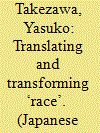

|
|
|
|
|
| Summary/Abstract |
Although it is an almost established understanding in European and North American literature that race is a social construct, the general academic and social discourses surrounding race in Japan remain outside this model. This can be traced back to school textbooks and geography books in the early Meiji period, after these concepts and words were translated and introduced from Europe and the United States. This article will examine passages related to race in textbooks from the first half of the Meiji period, in order to explore the continuities and discontinuities in the state of knowledge production surrounding race and racial discrimination in contemporary Japan. Investigating the usage of words in educational practice allows us to see how ‘race’ was a term that was located in a position different from that of other words, and how the Japanese transformed their racial position in relation to others.
|
|
|
|
|
|
|
|
|
|
|
|
|
|
|
|
| 4 |
ID:
123271
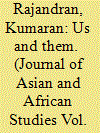

|
|
|
|
|
| Publication |
2013.
|
| Summary/Abstract |
This article conducts a linguistic analysis of the history textbook from Malaysia. It studies the way language portrays the Malaysians and British during colonization and independence. These periods are chosen because their economic and political changes resulted in social shifts which continue to influence modern Malaysia. The article analyzes the history textbook for secondary years two, three and five. Transitivity from Systemic Functional Linguistics is used as a method of analysis to explain the portrayal of the Malaysians and British during colonization and independence. The linguistic analysis of Participants (the nominal group) and Processes (the verbal group) discloses two major results. First, independence and the Malaysians are portrayed positively in the chapters about independence and identities of class and ethnicity are crucial to understand the Malaysians. Second, colonization and the British are portrayed negatively in the chapters about colonization. This posits a positive us and negative them distinction in the textbook. Hence the language of the history textbook can be interpreted as implying a nationalist version of history.
|
|
|
|
|
|
|
|
|
|
|
|
|
|
|
|
| 5 |
ID:
172376
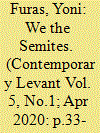

|
|
|
|
|
| Summary/Abstract |
This article reconceptualises ‘Semite’ as a contested chronotope in which Western scientific categories served Palestinian and Zionist educators’ claims to cultural self-determination and national claims over the same space, Palestine. Since the early nineteenth century, racial categories have gained prominence as useful scientific tools to differentiate peoples and cultures. This article analyses how Arabs and Jews adopted, translated, and engaged the term ‘Semite’, through an examination of Arabic and Hebrew history schoolbooks from the Mandate period. It surveys the genealogy of the term in Zionist and Palestinian historiography, showing the centrality of racial categories in the teaching of ancient history in mandate Palestine, and underlining parallels and differences in the engagement of Palestinian and Jewish educators with race. Finally, the article shows how the Palestinian-Zionist conflict wrote itself into the history textbooks, re-writing the ancient history of both peoples, and re-evaluating Palestine’s past through the prism of a contested chronotope, leading to a precarious present and an uncertain future.
|
|
|
|
|
|
|
|
|
|
|
|
|
|
|
|